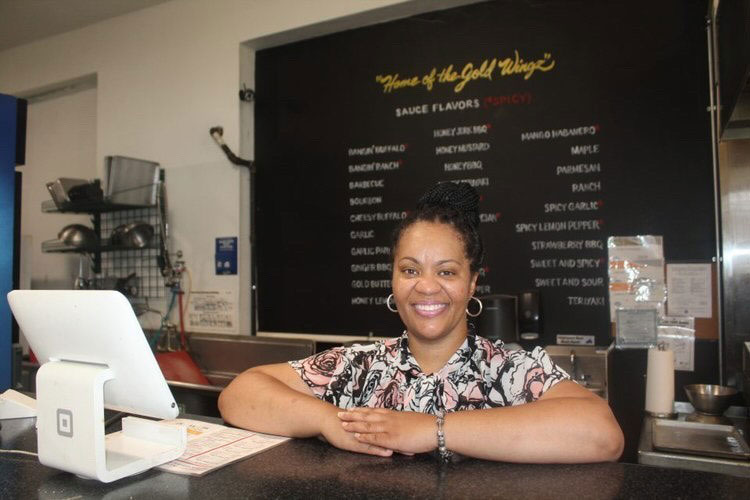 Nichole Jackson (MEd ‘00), owner of Chicago-based Bronzeville-Wingz
Nichole Jackson (MEd ‘00), owner of Chicago-based Bronzeville-WingzThis spring the
Women in Entrepreneurship Institute (WEI) at the Driehaus College of Business joined forces with the nonprofit YWCA Metropolitan Chicago to offer WEI’s business accelerator program to a cohort of Chicago-area women of color entrepreneurs. The YWCA, which works to eliminate racism and empower women through various programs and services, identified eight participants for the program, which shared techniques and resources for building business success in virtual workshop sessions that ran from April 9 through June 4.
Typically, 50-60% of the WEI’s accelerator program cohort members are women of color, but the YWCA cohort—dubbed the Breedlove Women of Color Accelerator due to its inspiration coming from 20th century African-American entrepreneur Sara Breedlove, known as
Madam CJ Walker—took that number to 100%.
“Women entrepreneurs are less likely than men to have access to capital and resources, and it's even more challenging for women of color,” explains Abigail Ingram, director of WEI. "Our new accelerator program helps women of color at a time they might not typically have access to help, when they've been in business a few years and want to grow."
Kelly Evans, vice president of Entrepreneurship and Community Economic Development at the YWCA, agrees. “The business women in this cohort are from our networks, and they have needs that are not generally met with typical accelerator programs. We felt that we could launch an accelerator that brings tremendous value to our participants if we focused both our agencies’ awesomeness in one place, rather than us designing something duplicative.”
Since it launched its first cohort at DePaul in 2018, the
WEI’s accelerator program has been providing a vital service to help women business founders scale their businesses. The new partnership—which brings WEI’s program to a specific demographic—aims to alleviate the many more obstacles that women of color entrepreneurs face as they work to grow their businesses.
“We have a model that works so we want to use it to serve as many women as possible,” says Ingram. “My plan is to make this the first of many partnerships we create with other organizations both in and outside of Chicago so we can continue to expand our impact.”
The WEI/YWCA cohort members’ businesses range from professional services to food ventures and are located mainly on the South Side of Chicago. As with all WEI participants, businesses must have annual revenues of at least $50,000 dollars in order to take part in the program.
Program Helps Business Founders Identify Obstacles to Growth
.jpg) Cohort member Cecelia Harrison, founder of ReveNewCycle Management and Consulting
Cohort member Cecelia Harrison, founder of ReveNewCycle Management and Consulting
A graduate of DePaul, Nichole Jackson (MEd ‘00) was one of the business founders in the cohort. She opened her restaurant, Bronzeville Wingz—her second food venture—in 2019 in an effort to revitalize her local community of Bronzeville, located on the South Side of Chicago, and provide healthier fast-food options in what she says is a food desert.
“I needed help learning how to scale my business but the program opened up my eyes to more than just that," Jackson says. “It gave me a better understanding of my business and helped me recognize the mistakes I made as an entrepreneur with a new startup.”
Another cohort member, Cecelia Harrison of ReveNewCycle Management and Consulting, a firm that specializes in revenue cycle management in healthcare, started her business because she noticed a disconnect between providers and administrators after working in the health information industry for more than 16 years—an issue that she says is especially prevalent within the black and brown communities.
“I signed up for this accelerator because I am a woman of color and have been in business for almost five years and have experienced many hurdles in trying to scale my business, from lack of funding to plain old discrimination,” Harrison says. “I gained so much from this experience I don’t know where to start. The program introduced me to different software systems and strategies that will make my life much easier and
keep my business profitable. I also learned how to identify issues that will hinder growth.”
In addition to launching the pilot YWCA cohort, the WEI also ran its fourth general—and biggest cohort to date—this past spring, with 16 women participants.
“Our mission at the WEI is to advance women entrepreneurs, and this partnership with the YWCA provides us another avenue through which we can do that,” Ingram says. “We want all women of all backgrounds to have equal access to opportunity—because opportunity is definitely not equal in this arena—so we are excited to bring our work into more neighborhoods in Chicago to serve even more women.”
The WEI’s next regularly scheduled cohort begins in September, with applications opening on their
website this month.